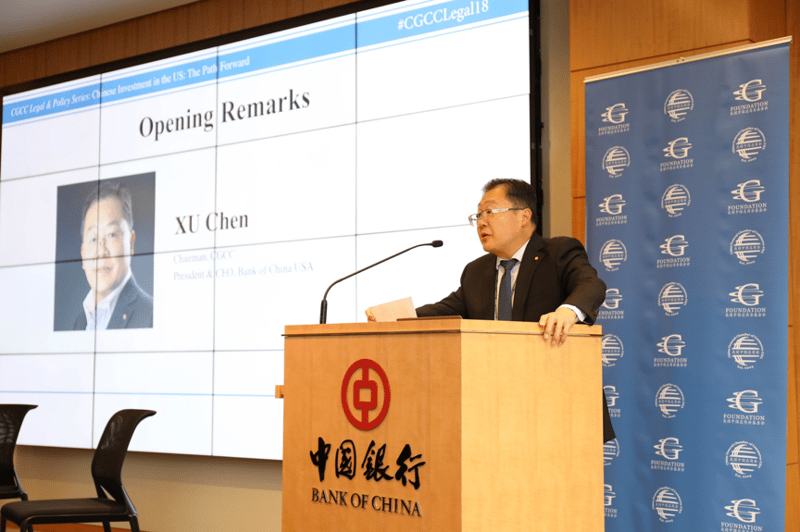
New York, October 15, 2018 – China General Chamber of Commerce – USA (CGCC) and CGCC Foundation hosted the “Chinese Investment in the US: The Path Forward-Legal and Regulatory Challenges” forum as part of CGCC’s Legal & Policy Series at Bank of China's, New York Branch Office. The event brought together over 120 US and Chinese business executives, legal experts and policy makers to discuss the various legal and regulatory challenges faced by Chinese companies in the ongoing trade war, and ways to navigate these challenges. Panelists also provided predictions on the future of China-US business relations.
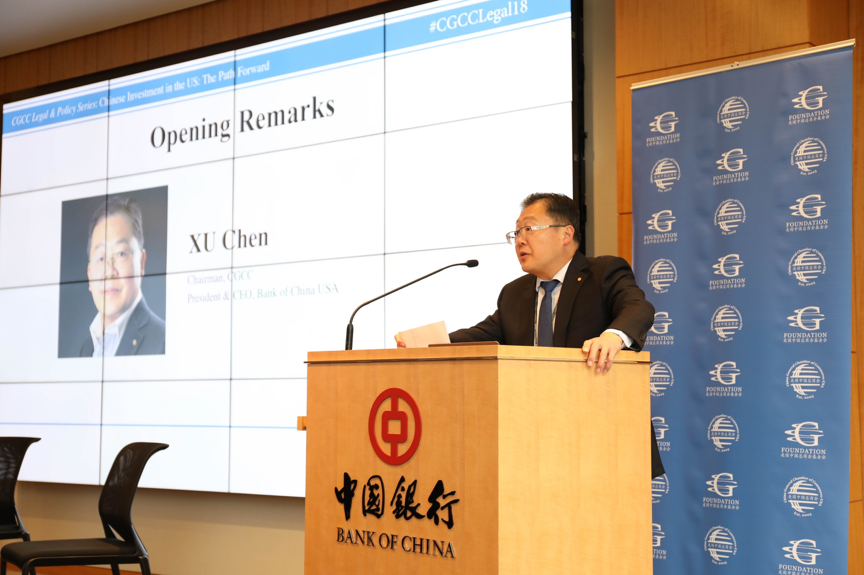
The event started with opening remarks by CGCC Chairman and President and CEO of Bank of China USA, Xu Chen. Xu emphasized that 2019 is the 40th anniversary of the establishment of formal diplomatic relations between China and the US. With this long history of relations between the two countries in mind, Xu stressed that the mutually beneficial economic relationship should develop at every level of government and business, “Cooperation through constructive dialogue, concessions on both sides, and fair and transparent negotiations between two governments will be able to succeed in creating a new and even stronger bond between China and the US,” said Xu.
In the first dialogue: “Outlook for China-US Trade and Investment,” moderated by Wang Guan, Chief Political Correspondent of CGTN America, Chuck Larson, Former US Ambassador to the Republic of Latvia; and Former Chairman of The Republican Party of Iowa, agreed that China has had impressive economic growth in recent years. Gary Horlick, Former International Trade Counsel of U.S. Senate Finance Committee and Former Head of Import Administration of U.S. Department of Commerce pointed out that the ongoing trade war will only result in losses on both sides. The panelists also briefly discussed how the upcoming mid-term election will impact the ongoing trade war.
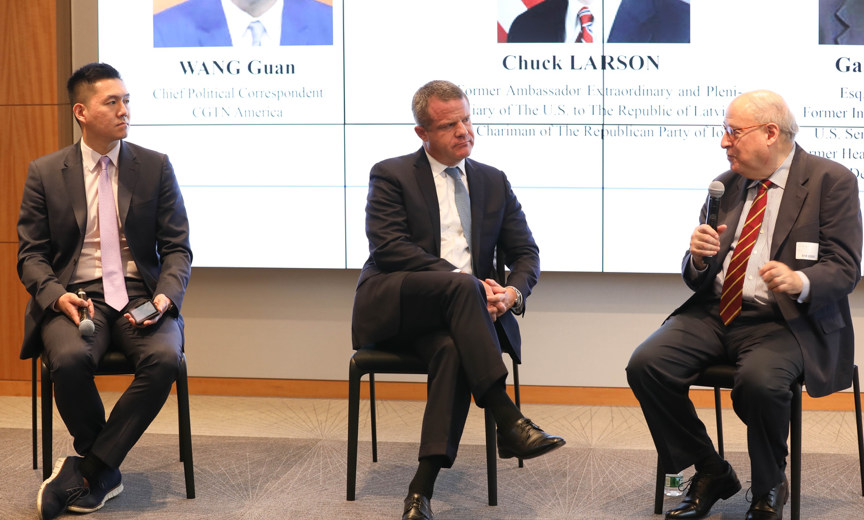
Following the opening dialogue, speakers on the first panel informed the audience of FIRRMA and the new developments within CFIUS. The speakers emphasized the expansion of CFIUS’ jurisdiction and the resulting critical procedural changes to foreign investment in the United States. Regarding the latest action of FIRRMA, Edward Shapiro, Partner at Latham & Watkins LLP expressed it is essential to help investors/mergers in understanding the scope, significance, and limits of the regulation. Jeffrey Houle, Partner at DLA Piper, emphasized the importance of time in merger and acquisitions, “Time is the enemy of all transactions, and all transactions should act as quick as possible,” he said.
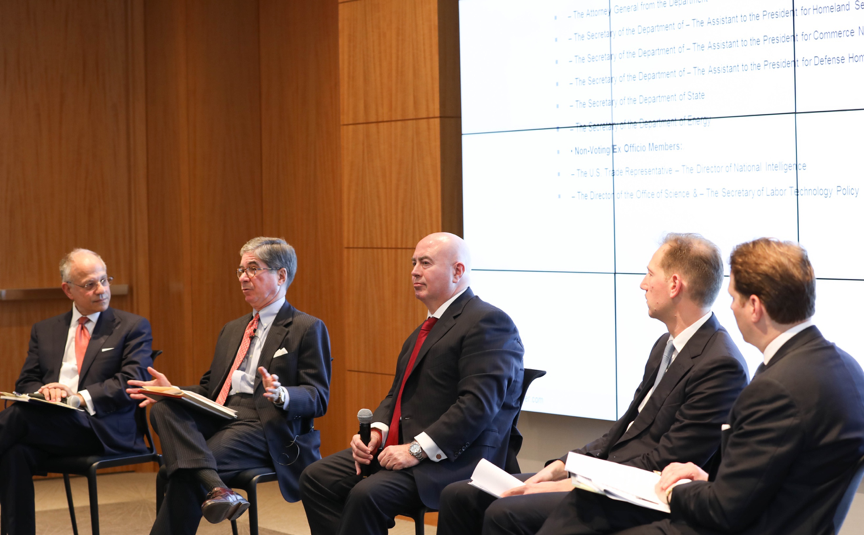
The event concluded with a second panel discussion, “International Trade Challenges and Strategies,” where speakers conversed on a variety of topics such as Section 301 of the Trade Act, Export Controls Act of 2018, and expressed their thoughts on the current state of China-US relations. The panelists stressed that if The Office of the United States Trade Representative initiates a Section 301 investigation, it must seek to negotiate a settlement with the foreign country in the form of compensation or elimination of the trade barrier. Moreover, the panelists explained that the goal of the Export Controls Act of 2018 is to advance the US’s national security, foreign policy, and economic objectives by promoting US strategic technology leadership. As a practical and political matter, these laws have a significant impact on China-US trade relations, affecting global supply chains, investment decisions and business operations in multiple markets.
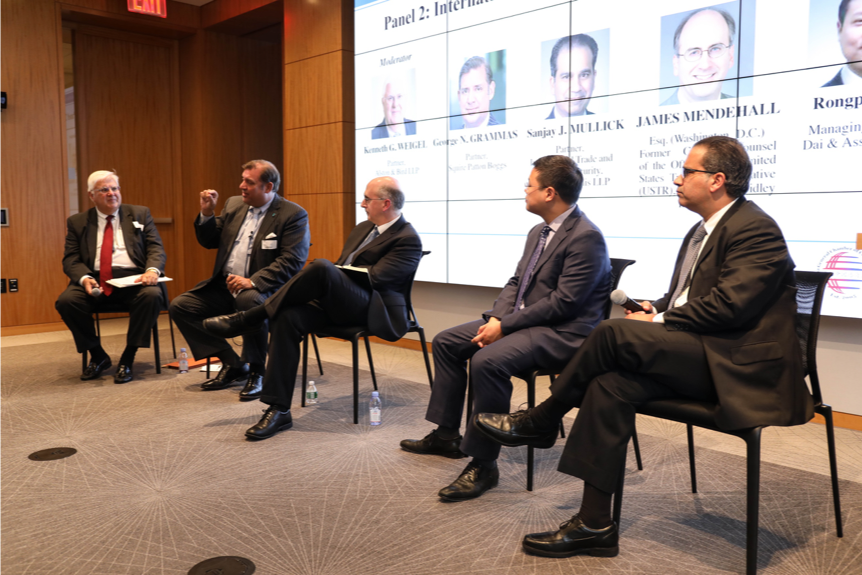
George N. Grammas, Partner at Squire Patton Boggs; Kenneth G. Weigel, Partner at Alston & Bird LLP. during the discussion.
CGCC-USA sincerely thanks Bank of China USA and all the panelists for supporting this event. CGCC will continue to support and organize events that generate conversations and improve mutual understanding between China and the US in trade issues.
Follow @CGCCUSA and the event hashtag #CGCCLegal18 on Twitter for further coverage of this event
Press Coverage:
News Analysis: U.S. trade deficit not to fall as economy continues to grow
Spotlight: Good faith, trust required to settle U.S.-China trade disputes